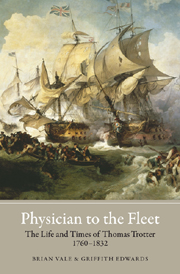Book contents
- Frontmatter
- Contents
- List of Illustrations
- List of Abbreviations
- Foreword
- Preface
- Background
- From Surgeon's Mate to Physician to the Fleet
- The Newcastle Years
- 12 Married Life and Civilian Practice
- 13 An Essay on Drunkenness
- 14 A War of Pamphlets
- 15 A View of the Nervous Temperament
- 16 Physician as Poet and Playwright
- 17 Thomas Trotter and the Great Theatre of Life
- Bibliography
- Index
15 - A View of the Nervous Temperament
from The Newcastle Years
Published online by Cambridge University Press: 12 September 2012
- Frontmatter
- Contents
- List of Illustrations
- List of Abbreviations
- Foreword
- Preface
- Background
- From Surgeon's Mate to Physician to the Fleet
- The Newcastle Years
- 12 Married Life and Civilian Practice
- 13 An Essay on Drunkenness
- 14 A War of Pamphlets
- 15 A View of the Nervous Temperament
- 16 Physician as Poet and Playwright
- 17 Thomas Trotter and the Great Theatre of Life
- Bibliography
- Index
Summary
IN 1807, three years after the Essay on Drunkenness had reached the bookshops, Trotter published another major text, with the same kind of joint lay and professional readership intended. The full title of the new book was A View of the Nervous Temperament being a Practical Enquiry into the Increasing Prevalence, Prevention and Treatment of those Diseases commonly called Nervous, Bilious, Stomach and Liver Complaints, Indigestion, Low Spirits, Gout etc. – a title virtually as synopsis. Further editions appeared in 1807 and 1812. A facsimile edition appeared in 1976 in an American ‘Classics in Psychiatry’ series. The choice of James Gregory, then head of the Edinburgh Medical School, as person to whom the book was dedicated, was designed to enhance Trotter's credibility with the medical profession, although Gregory was not as well known as Jenner. At various points in the text Trotter stressed the extent of his medical experience, with an insistence that it had encompassed much more than the treatment of the fleet. His views were therefore
the result of a more extensive field of experience than generally falls the lot of every physician: for it has been acquired by attendance on some thousands of cases in both sexes, under all varieties of rank, employment, age, situation, climate etc.
The two sides of Georgian prosperity
Fully to comprehend the significance of Trotter's social critique one needs to be reminded of the magnitude of what was taking place in Britain at the time. The Georgian period was one of unprecedented change and prosperity. By its end, the agricultural scene had been transformed by the enclosure of common land and improvements to soil, crops and livestock. Likewise, industry had been revolutionized by new technological processes, the ingenuity of profit-seeking entrepreneurs, the availability of raw materials like coal and iron and the development of speedy transport systems, notably canals and turnpikes. And in support, trade, backed by the necessary infrastructure of banks, credit, insurance and ships, was flourishing.
- Type
- Chapter
- Information
- Physician to the FleetThe Life and Times of Thomas Trotter, 1760–1832, pp. 185 - 198Publisher: Boydell & BrewerPrint publication year: 2011



